- Home
- William Goldman
Which Lie Did I Tell?
Which Lie Did I Tell? Read online
Acclaim for WILLIAM GOLDMAN’s
WHICH LIE DID I TELL?
“[C]ompelling … full of practical advice for the aspiring screenwriter.”
—The New York Times
“Which Lie Did I Tell? is an invaluable guide for any screenwriter—perhaps the best there is. At once anecdotal and anarchic, gossipy and guiding, professional and provocative, it surpasses the justly celebrated original…‖. This is an excellent guide to screenwriting … an essential document of the movie industry in the late twentieth century.”
—The Sunday Times (London)
“Required reading for anyone who thinks they want to quit their job and write a script.”
—Details
“[R]ancorous, groovy … full of delightfully tough-talking insiderisms.”
—Newsday
“This is entertaining—even by Goldman’s usual standards. Just about the most fun you can have reading.”
—John Cleese
“Two-time Oscar-winning screenwriter Goldman follows up his irreverent, gossipy, and indispensable screenwriting bible, Adventures in the Screen Trade (1983), with this equally wise, tart, and very funny account of the filmmaking process.”
—Publishers Weekly
“William Goldman has done it again with his highly entertaining and self-deprecating humor. He’s one of the best writers I’ve ever had the pleasure of working with. He takes Hollywood apart—which, in this case, is a very good thing.”
—Clint Eastwood
FIRST VINTAGE BOOKS EDITION, FEBRUARY 2001
Copyright © 2000 by William Goldman
All rights reserved under International and Pan-American Copyright Conventions. Published in the United States by Vintage Books, a division of Random House, Inc., New York, and simultaneously in Canada by Random House of Canada Limited, Toronto. Originally published in the United States by Pantheon Books, a division of Random House, Inc., New York, in 2000.
Vintage and colophon are registered trademarks of Random House, Inc.
The Library of Congress has cataloged the Pantheon edition as follows:
Goldman, William, 1931–
Which lie did I tell? : more adventures in the screen trade / by William Goldman.—1st ed.
p. cm.
ISBN: 0-375-40349-3
Includes index.
1. Goldman, William, 1931– —Motion picture plays. 2. Screenwriters—United States—Biography. 3. Motion picture industry—United States. 4. Motion picture authorship. 5. Hollywood (Los Angeles, Calif.)—History. I. Title
PS3557.O384 Z476 2000
384′.8′0979494—dc21 99-45130
CIP
Vintage ISBN: 0-375-70319-5
eBook ISBN: 978-0-307-76479-9
Author photo © Terry O’Neill
www.vintagebooks.com
v3.1
For Ingmar and Ernie and Bob
For Bobby and Peter and Scott
For Joel and Ethan and Nora
For Callie and Tony and John.
And Sue
For screenwriters suffering everywhere
(It’s what we do)
CONTENTS
Cover
Title Page
Copyright
Dedication
Introduction
I. More Adventures
The Leper [1980–85]
Memoirs of an Invisible Man [1986]
The Princess Bride [1987]
Misery [1990]
The Year of the Comet (Alas) [1992]
Maverick [1994]
The Ghost and the Darkness [1996]
Absolute Power [1997]
II. Heffalumps!!!
There’s Something About Mary
When Harry Met Sally
North by Northwest
The Seventh Seal
Chinatown and Fargo
Butch Cassidy and the Sundance Kid
III. Stories
Story One: The Old Guy
Story Two: The Good Guy
Story Three: The Mastermind
Story Four: The Dolphin
IV. The Big A
Index
Permissions Acknowledgments
About the Author
Other Books by This Author
INTRODUCTION
* * *
This book began a decade ago because of one single moment that happened at Oberlin College.
One of the salvations of my life is that I went to Oberlin—a great school if you don’t mind the weather and if you’ve realized that it’s okay to be just a little bit strange.
Anyway, there I was back in Ohio and one afternoon I met with a bunch of student writers to answer their questions about Hollywood. I remember the moment so clearly. This girl stood up. Slender, wearing red, so obviously bright and intense, and before she spoke I realized whatever she was about to ask mattered. She was leaning in toward me and she was almost trembling, and when she spoke it was with such clarity and power. These were her words: “Mr. Goldman, Mr. Goldman, do you always begin your second theme by page seventeen?—”
I was so stunned. The question would not stop echoing inside me: “Mr. Goldman, Mr. Goldman, do you always begin your second theme by page seventeen?—”
Because, you see, I didn’t know what a second theme was. I literally did not know what language she was speaking. But she had this nugget, this bit of data, and she was going to build her church on it—and it would not stand. Her church would crumble the moment weight was applied. (There are, scattered throughout this book, sidebars that deal with specific questions. I wish I’d had a sidebar for that girl in red.)
But she made me realize, truly she did, that I would have to write another book about screenwriting. Because movies are not about second themes or about dialogue or pretty stars. Because if screenplays are structure, and they are, then movies are story.
And this is a book about storytelling on film …
It’s also about the screenwriter’s life. Has to be. You meet people in this business, and one thing you must know is that just about everyone you come in contact with seems shockingly normal. Executives, producers, directors, stars. Do not be fooled. Since movies succeed by word of mouth, something you cannot manufacture, everyone in the business is constantly in fear of losing their spot by the fire. Since they have no idea what got them there in the first place, this all makes for a certain lunacy and insecurity. (Everyone assumes, correctly, that being writers, we are already loony and insecure.)
I was in Las Vegas once with a producer who was promoting his various projects on the phone. We were in his hotel suite and he clearly wanted me to listen, since he chose not to go into the bedroom. On and on he went, phone call after phone call, spouting inaccurate grosses, potential star castings, stuff like that.
Perversely, since he wanted me to know what a big deal he was, and since I already did know he was an asshole, I decided to hear nothing. I picked up a copy of Sports Illustrated, read for quite a while—
Until suddenly I heard my name, whispered sharply, “—Bill—Bill”—I glanced over and there he was, his hand over the mouthpiece. Then came these words: “Which lie did I tell?”
Understand, he had no look of shame on his face. This was all said in the interest of accuracy.
Storytellers tell lies too. We must. Story ideas surround us, but they need shading, shaping, climaxes, beginnings; that’s our job. What we must try and learn is which are the best lies, best in the sense of helpful. When we try and tell our stories, we all need help. I hope there’s some here. For you.
I.
More Adventures
* * *
The Leper
[1980–85]
* * *
I don’t think
I was aware of it, but when I started work on Adventures in the Screen Trade, in 1980, I had become a leper in Hollywood.
Let me explain what that means: the phone stopped ringing.
For five years, from 1980 till 1985, no one called with anything resembling a job offer. Sure, I had conversations with acquaintances. Yes, the people whom I knew and liked still talked to me. Nothing personal was altered in any way.
But in the eight years prior to 1978, seven movies I’d written were released. In the eight years following, none.
I talked about it recently with a bunch of young Los Angeles screenwriters, and what I told them was this: If I had been living Out There, I don’t think I could have survived. The idea of going into restaurants and knowing that heads were turning away, of knowing people were saying “See him?—no, don’t look yet, okay, now turn, that guy, he used to be hot, can’t get arrested anymore,” would have devastated me. In L.A., truly, there is but one occupation, the movie business. In New York, the infinite city, we’re all invisible.
Example: my favorite French bistro is Quatorze Bis, on East Seventy-ninth. Best fries in town, great chicken, all that good stuff. Well, I was there one night last year when another guy came in, and we had each won two Oscars for screenwriting, and we lived within a few blocks of each other—
—and we had never met. (It was Robert Benton.)
Impossible in Los Angeles. But that kind of thing was my blessing during those five years.
My memory was that the leprosy didn’t really bother me. I asked my wonderful ex-wife, Ilene, about it and she said: “I don’t think it did bother you, not being out of Hollywood, anyway. But one night I remember you were in the library and you were depressed and I realized it was the being alone that was getting to you. You always enjoyed the meetings, the socialness of moviemaking. You were always so grateful when you could get out of your pit.”
I wrote five books in those five years (couldn’t do it now, way too hard) and then the phone started ringing again.
This is why it stopped in the first place.
There is a famous and amazingly racist World War I cartoon that showed two soldiers fighting in a trench. One was German, the other an American Negro who had just swiped at the German’s throat with his straight razor. (When I say racist, I mean racist.) The caption went like this:
German Soldier: You missed.
American Soldier: Wait’ll yo’ turn yo’ head.
The point being, in terms of my screenwriting career, I never turned my head. Looking back, there was no real reason to. I was on my hot streak then. I was a Good Housekeeping Seal of Approval in those years. Between ’73 and ’78 this is what I wrote:
Three novels:
The Princess Bride (1973)
Marathon Man (1974)
Magic (1976)
And six movies:
The Great Waldo Pepper (1975)
The Stepford Wives (1975)
All the President’s Men (1976)
Marathon Man (1976)
A Bridge Too Far (1977)
Magic (1978)
If you had told me, that 1978 November day when Magic opened, that it would be nine years before my next picture appeared, I doubt I would have known what language you were speaking.
It wasn’t as if I’d stopped writing screenplays after Magic. But the lesson I was about to learn was this: studios do not particularly lose faith in a writer if a movie is terrible. Producers do not forget your name if a movie loses lots of money. Because most studio movies lose lots of money (they survive on their hits). If, say, they chose directors who had only hits, they would be choosing from a practically nonexistent list. All anybody wants, when they hire you, is this: that the movie happen.
The change came after A Bridge Too Far.
Joseph E. Levine, the producer of that film, thought of me as a kind of good luck talisman. His career was not exactly rocketing the years before Bridge, and when that movie brought him back close to the fire, he attributed a lot of it to me. And he wanted to go into business with me. He bought my novel Magic, made that movie, and then proposed a three-picture deal: I would write three original screenplays for him, pretty much of my own choosing. I had never signed a multiple deal before, never thought I would. But I jumped at it. The work experiences with him had been so decent, unlike a lot of the standard Hollywood shit we all put up with.
One thing that made Mr. Levine unique was that he was the bank. He made his movies with his own money, took no studio deals until late in the game, when he had something to show. He was gambling that he would find movie studios who would want to buy, and he had gotten rich that way. Bridge had cost him $22 million. An insane gamble in today’s world, nuttier back then. But the day it opened it was $4 million in profit. Mr. Levine sold the movie everywhere, Europe, Asia, country by country, territory by territory; he had collected $26 million by opening day.
Typical of his bravery was one day when he was in a hospital in New York after surgery. I was visiting him, and the director, Richard Attenborough, called from Holland. They were shooting the crucial parachute drop, and the weather had been dreadful. The parachutists were willing to work the next day, a Saturday.
Attenborough requested that extra day. It would cost Levine seventy-five thousand of his own dollars. Levine screamed at Attenborough for even suggesting such a thing. Attenborough repeated his request. Levine asked if he had sufficient footage for the sequence as it was. Attenborough said he had more than enough but it was all drab-looking. Levine screamed at him again. It was a ridiculous request. Attenborough held tough, saying the extra day might make all the difference. Levine then asked what was the weather report for Saturday. Attenborough admitted it was for more of the same: dreary.
Now Levine really let fly. You limey bastard, on and on, and he finally hung up on Attenborough. But not before he agreed to the extra day. The weather turned glorious and almost the entire wonderful drop sequence comes from that extra day.
Try getting a studio to do that.
So the fact that Mr. Levine did not need studio backing, that he cared not at all for studio money or thinking, was a huge factor in my agreeing to the three-picture deal.
It turned out to be a huge contributor to my downfall.
The Sea Kings was the first of the three-picture deal. A pirate flick. Came from a great snippet of material. In the early 1700s, the most famous, and most lethal, pirate was Blackbeard. At the same time, living on the island of Barbados, was a fabulously wealthy planter, Stede Bonnet.
Bonnet had been a soldier but had never seen action. He had a monstrous wife. Had almost died the previous winter. And, in a feat of great lunacy unmatched just about anywhere on earth, Bonnet decided to become a pirate. He commissioned a ship—the only such one in history, by the way. Pirate ships were always stolen.
So off he sailed.
And met, for a blink, Blackbeard.
They did not sail together for very long, but the idea of these two strange and remarkable men knocked me out. So I wrote The Sea Kings about them. (Butch and Sundance on the high seas, if you will.)
The decision that I made was this: Bonnet, rich beyond counting and miserably unhappy, a student of piracy, wanted one thing more than any other: an adventure-filled life (and if that included death, so be it). Blackbeard was sick up to here with his adventure-filled life. Piracy was getting tougher and tougher, and he was broke, as all pirates (save Bonnet) were. What he wanted was a long, comfortable life and a sweet death in bed.
So I wrote a movie about two men who were each other’s dream.
It was filled with action and blood and double crosses and I hoped a decent amount of laughter. When I was done, I gave it to Mr. Levine.
Who just loved it.
The Year of the Comet was my second original, a romantic thriller, about a chase for the world’s greatest bottle of wine, and you can read all about it in the chapter with its name on it. I will add only this here—
—Mr. Levine loved it t
oo.
I wrote the part of Blackbeard for Sean Connery, and Mr. Levine got the idea of casting the two James Bonds, having Roger Moore play the more elegant Bonnet. Another casting notion was the two Moores: Dudley (10 had happened) as Bonnet, Roger shifting over to Blackbeard.
In the wine movie, he wanted Robert Redford in the Cary Grant part.
Obviously, you did not see these movies.
What happened?
When Mr. Levine had come to me for A Bridge Too Far, he was pushing seventy, and he hated being out of the loop, was willing to take almost any gamble. Now that Bridge and Magic had helped restore him, his needs were lessened.
He was also older now.
But most critical: the price of movies had begun to skyrocket. So the fact that he was his own bank, so wonderful earlier, was now a huge problem—he was rich, but not that rich. Some research was done on the cost of constructing that everyday little item, the pirate ship.
You don’t want to know.
Stars’ salaries.
You don’t want to know.
He had chances to lay the scripts off to studios but he couldn’t do that, y’see, because then he’d be just like everybody else, taking shit from the executives. When he was the bank, he gave shit. I heard him blow studio heads out of the water. I saw him sit at his desk, smiling at me, while he hurled the most amazing insults at these Hollywood powers—
—and they had to take it—
—because he had movies they wanted.
That was the fucking staff of life for the old man. His ego would not allow him to be just like everybody else. He didn’t need it.
So both scripts just lay there. (They very well may have been unusable scripts—always a very real possibility when I go to work—but that was not the governing principle here.) I never wrote the third original—Mr. Levine and I parted company.

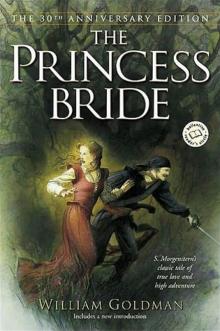 The Princess Bride
The Princess Bride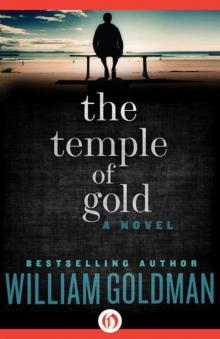 The Temple of Gold
The Temple of Gold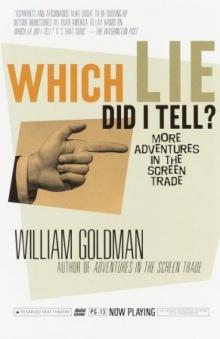 Which Lie Did I Tell?: More Adventures in the Screen Trade
Which Lie Did I Tell?: More Adventures in the Screen Trade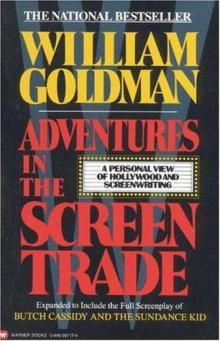 Adventures in the Screen Trade
Adventures in the Screen Trade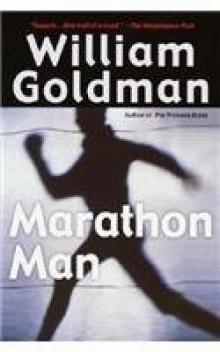 Marathon Man
Marathon Man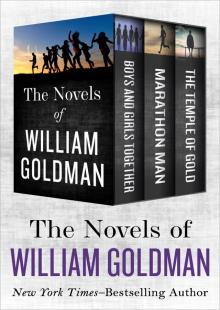 The Novels of William Goldman: Boys and Girls Together, Marathon Man, and the Temple of Gold
The Novels of William Goldman: Boys and Girls Together, Marathon Man, and the Temple of Gold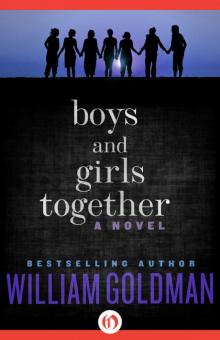 Boys and Girls Together: A Novel
Boys and Girls Together: A Novel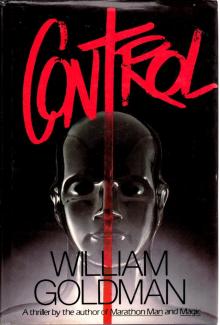 Control
Control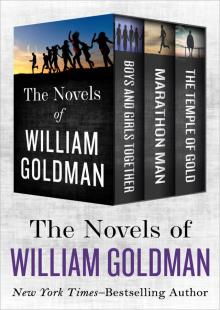 The Novels of William Goldman
The Novels of William Goldman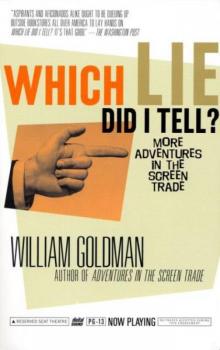 Which Lie Did I Tell?
Which Lie Did I Tell?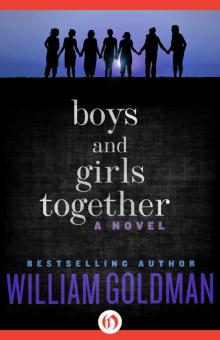 Boys & Girls Together
Boys & Girls Together